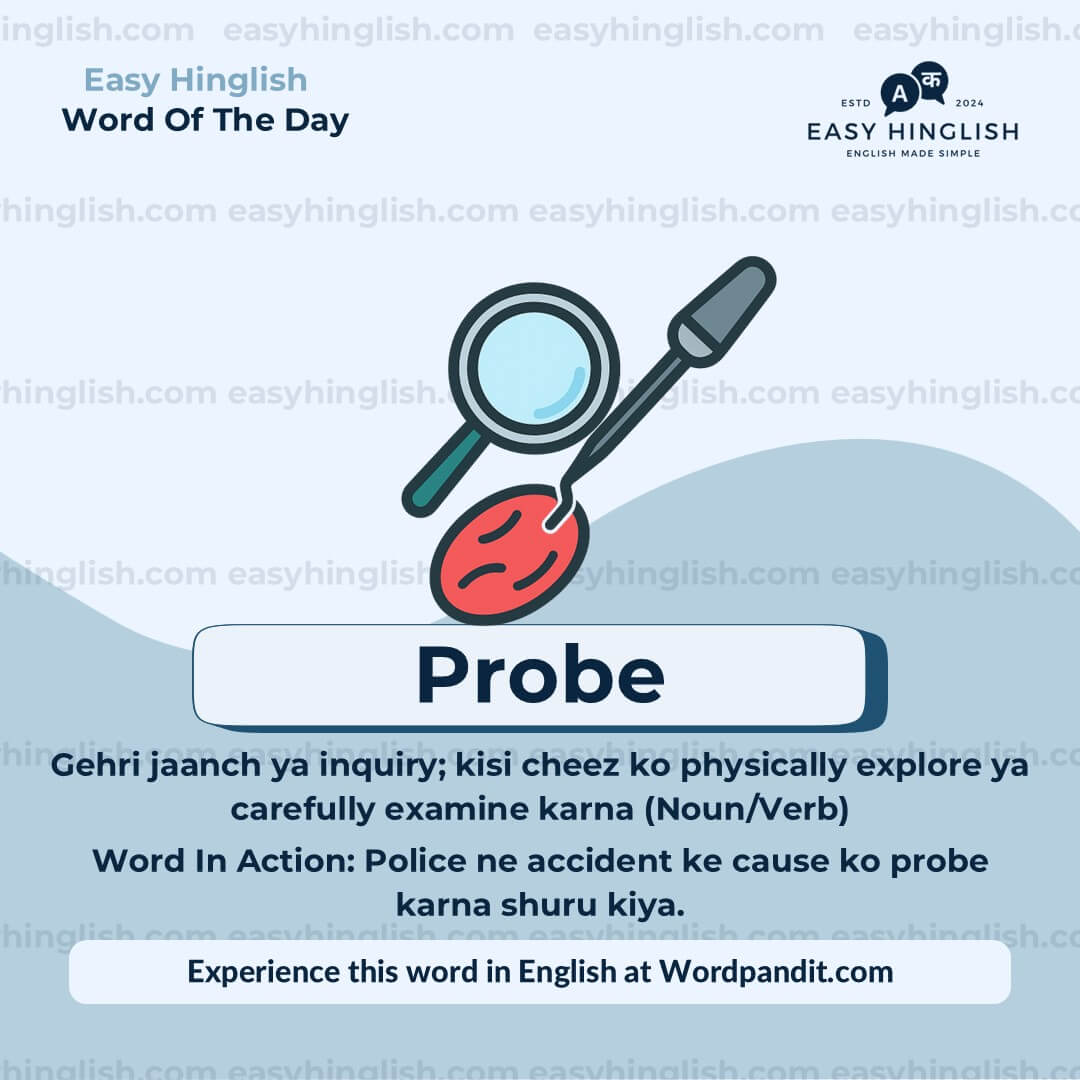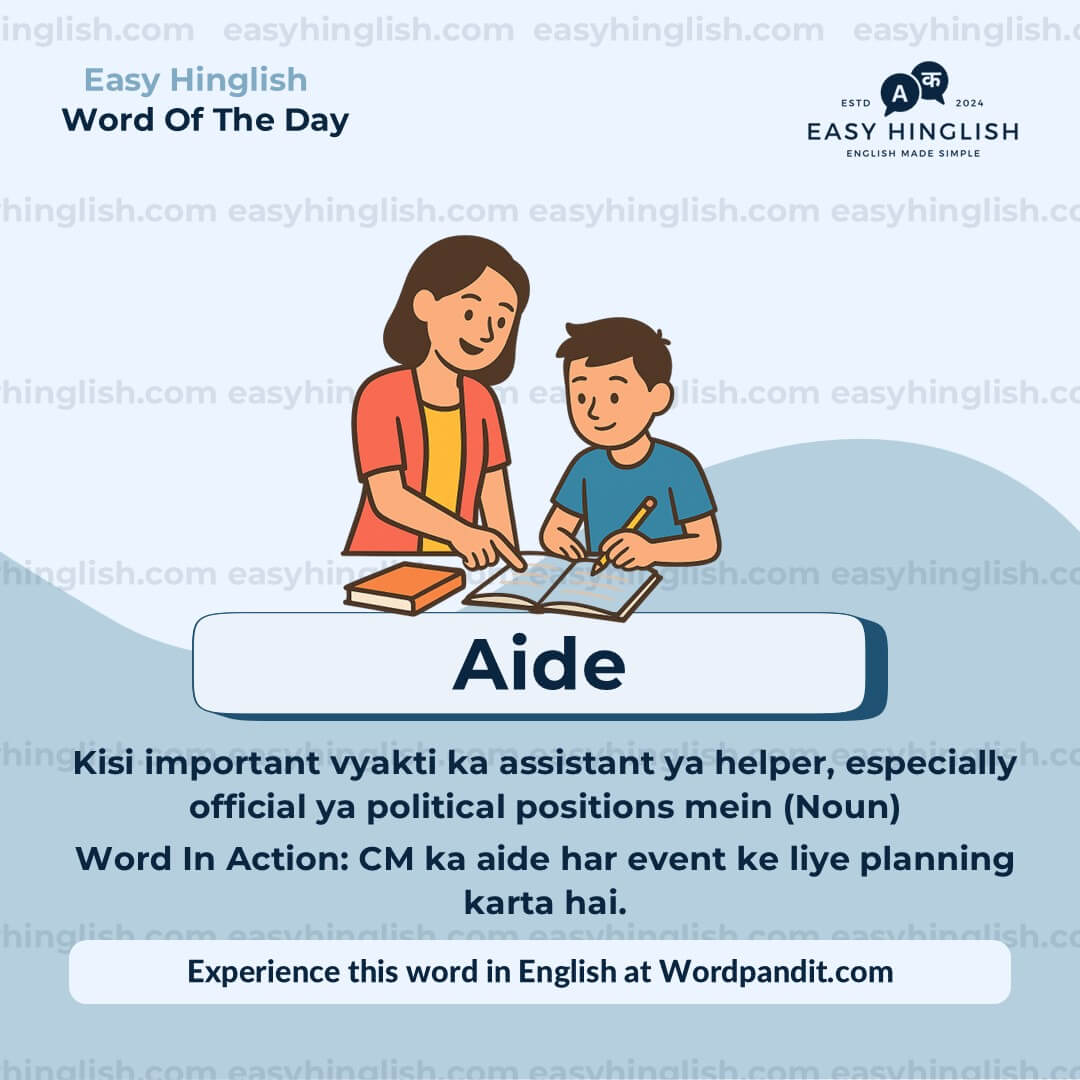Daily Vocabulary Indian Newspapers aur Publications se Seekho
Welcome to Wordpandit ka Indian Vocabulary Hub
Wordpandit par, hum samajhte hain ki ek achhi vocabulary develop karne ke liye local context samajhna bhi zaroori hai. Is section ka focus hai aapke vocabulary ko India ke leading newspapers aur publications se naye shabdon aur phrases ke zariye improve karna, taaki aap practical, relevant, aur uniquely Indian words seekh sakein.
Indian Sources Itne Important Kyun Hain?
Hum maante hain ki kisi bhi language ko sikhne ka sabse best tareeka hai uske local content me immerse hona. Isi wajah se hum carefully words curate karte hain top Indian newspapers aur publications se, jaise:
- The Hindu
- The Times of India
- The Economic Times
- Hindustan Times
- Live Mint
- The Indian Express
- Aur bhi bahut saare...
Hamesha Updated Raho, Hamesha Relevant Raho
Daily updates ke saath, aap Indian news sources se naye words seekhoge jo Indian society aur culture ke latest trends ko reflect karte hain. Hamara focus hai aise words provide karna jo aapke liye real-world me useful ho.
Wordpandit Aapke Learning Goals Ko Kaise Support Karta Hai?
Chahe aap exams ki preparation kar rahe ho, professional communication improve karna chahte ho, ya sirf naye words seekhna chahte ho, Wordpandit har step par aapki madad karega.
Practical Tareeke Se Seekho
Hamari interactive learning methodology me real-world examples, engaging activities, aur context-based usage shamil hain, taaki har naya shabd aapki active vocabulary ka hissa ban sake.
Aaj Hi Indian Vocabulary Seekhna Shuru Karo!
Wordpandit Kyun Choose Karein?
Practical Learning: Aise words seekho jo aapko real-world reading aur communication me sach me kaam aayenge, taaki aapki comprehension aur bolne ki skills improve ho.
Diverse Content: Current affairs se lekar scientific breakthroughs tak, hamare different sources aapko multiple domains ka vocabulary sikhate hain.
Effortless Integration: Wordpandit ko apni daily routine ka part banao. Sirf kuch minute har din dene se aapki vocabulary time ke saath kaafi improve ho sakti hai.
Aapka Vocabulary Mastery Tak Ka Safar
- Regularly hamare Daily Vocabulary section ko visit karo
- Naye words explore karo aur unka context me use samjho
- In words ko apni writing aur bolne ki practice me use karne ki koshish karo
- Jaise-jaise aapke words badhte hain, apni progress ko track karo
Aaj Se Apni Vocabulary Journey Shuru Karo!
Wordpandit ke saath vocabulary improve karna start karo. Roz thoda effort dalne se aap ek strong vocabulary develop kar sakte ho jo academic, professional, aur personal life me kaafi kaam aayegi.
Yaad rakho, ek naya shabd roz seekhna linguistic limitations ko door karne ka best tareeka hai! Wordpandit ko apni daily learning journey ka sathi banao aur vocabulary excellence ki taraf badho!
WORD-1: Strive
Sandarbh (Context):
"Everyone has the right to promote and strive for the protection and realization of human rights." - The Wire
Vyakhya (Explanatory Paragraph):
Strive ka matlab hai 'kisi goal ko achieve karne ke liye lagatar aur determined effort karna.' Yeh word tab use hota hai jab aap dikhana chahte hain ki koi continuously aur purposefully kisi cheez ke liye mehnat kar raha hai, sirf ek baar try nahi kar raha. Strive ka upyog competitive exam essays, formal speeches, aur motivational writing mein hota hai jahan persistent effort aur dedication express karni ho. Indian English newspapers mein strive kaise use karte hain: aksar social justice, development goals, aur personal achievement ke contexts mein milta hai.
Arth (Meaning): Kisi cheez ko paane ke liye poori taaqat se mehnat karna, struggle karna (Verb)
Uccharan (Pronunciation): STRAYV (स्ट्राइव)
Kathinai Star (Difficulty Level): ⭐⭐ Basic se Intermediate
Utpatti (Etymology): Strive Old French word 'estriver' se aaya hai jiska matlab tha 'jhagadna ya compete karna,' jo Germanic root se bana jiska sense tha 'struggle karna.' Samay ke saath yeh word evolve hua aur aaj iska meaning hai earnest efforts lagana kisi goal ke liye, lekin aaj bhi ismein woh persistence aur determination ka bhav hai jo obstacles ko overcome karne ke liye zaroori hai.
Prashant Sir Ke Tathya (Prashant Sir's Notes):
Bahut students 'strive' ko simple 'try' se confuse karte hain—strive aur try mein kya farak hai? Strive hamesha sustained aur determined effort dikhata hai jo time ke saath continue hoti hai, jabki try ek single attempt ho sakta hai. CAT aur UPSC ke students ke liye, strive aksar social justice, personal growth, aur organizational mission statements mein dikhta hai. Strive ka sahi istemal kaise karein: iske baad 'to' (strive to succeed) ya 'for' (strive for excellence) aata hai, kabhi 'at' ya 'toward' nahi. Indian newspapers ke editorial sections mein aapko 'strive for equality' ya 'strive to achieve' tab milega jab national development aur constitutional values ki baat ho rahi ho.
Samanarthi & Vipritarthi (Synonyms & Antonyms):
Samanarthi (Synonyms): endeavor, struggle, attempt, try hard, work toward, labor, fight, aim, aspire, pursue vigorously, mehnat karna
Vipritarthi (Antonyms): neglect, ignore, abandon, give up, quit, surrender, chhod dena
Udaharan (Usage Examples):
- Government ko transparency ke liye strive karna chahiye taaki recent corruption scandals ke baad public trust wapas mil sake.
- Priya apni demanding corporate job aur family time ke beech balance ke liye roz strive karti hai, haalaanki yeh challenge usse exhaust kar deta hai.
- IIT aur IIM jaise educational institutions ko strive karna chahiye ki sabhi students ko equal opportunities milein, chahe unka background kuch bhi ho.
- Apne startup mein kai setbacks ke baawajood, Arjun success ke liye unwavering determination ke saath strive karta rehta hai.
Sanskritik Sandarbh (Cultural Reference):
"Hume ek aisa Bharat banana chahiye jahan har naagrik ko education, healthcare aur dignity milne ke liye strive karna hoga." - Independence Day speeches aur national policy documents mein common theme
Sochiye (Think About It):
Perfection ke liye strive karna aur excellence ke liye strive karna mein kya farak hai? Indian competitive environment mein kaunsa approach zyada healthy hai?
Chhoti Kriya (Quick Activity):
Apni academic ya professional life mein aap kis cheez ke liye strive karte hain? Do sentences likhein aur ek obstacle identify karein jo aapko overcome karna hai.
Yaad Karne Ka Tarika (Memory Tip):
'Strive' ko aise yaad rakhein: 'STRIVE = Strong Tries In Various Efforts.' Virat Kohli ko imagine karo jo runs ke liye strive kar rahe hain—sirf ek baar try nahi, balki ball after ball, match after match continuous determined effort laga rahe hain.
Vastavik Jeevan Me Upyog (Real-World Application):
Formal essays, mission statements, aur motivational speeches mein 'strive' preferred word hai jab commitment dikhani ho. Corporate vision statements mein aksar "we strive to..." use hota hai organizational values communicate karne ke liye. UPSC aur CAT ke essays mein 'strive' use karna simple 'try' se better hai kyunki yeh sophisticated vocabulary demonstrate karta hai aur aapke arguments ko—chahe woh social change, personal development ya institutional reform ke baare mein ho—zyada weightage deta hai.
WORD-2: Delegitimising
Sandarbh (Context):
"They should be protecting them, but instead they are delegitimising their efforts and message, exposing them to threats and physical attacks, and subjecting them to arbitrary arrest and detention." - The Wire
Vyakhya (Explanatory Paragraph):
Delegitimising ka matlab hai 'kisi cheez ya vyakti ki legitimacy, validity ya credibility ko undermine karna ya khatam karna.' Yeh word tab use hota hai jab aap dikhana chahte hain ki koi actions le raha hai jo kisi person, institution, movement ya idea ko invalid ya unworthy of recognition banate hain. Delegitimising ka upyog political discourse, news analysis, aur competitive exam passages mein commonly hota hai jahan power dynamics, social movements, aur institutional credibility discuss ki ja rahi ho. UPSC aur CAT ke RC passages mein delegitimising kaise use karte hain: aksar authority ko challenge karne aur systematic undermining dikhane ke contexts mein.
Arth (Meaning): Kisi cheez ya kisi ko illegitimate ya invalid dikhana, authority ya acceptance ko kamzor karna (Verb, present participle)
Uccharan (Pronunciation): dee-luh-JIT-ih-my-zing (डी-लह-जिट-इ-माई-ज़िंग)
Kathinai Star (Difficulty Level): ⭐⭐⭐ Intermediate
Utpatti (Etymology): Delegitimising word bana hai prefix 'de-' (jiska matlab hai removal ya reversal) ko 'legitimise' ke saath jodkar, jo Latin word 'legitimus' se aaya hai jiska matlab hai 'lawful.' Yeh word 20th century ke political discourse mein prominent hua jab governments, movements, ya individuals ki authority aur credibility ko systematically undermine karne ki process describe karni thi by questioning their right to exist or operate.
Prashant Sir Ke Tathya (Prashant Sir's Notes):
Students aksar poochhte hain: delegitimising aur criticizing mein kya farak hai? Criticism specific actions ya ideas ko target karti hai, jabki delegitimising ka matlab hai kisi cheez ke fundamental right ya authority ko hi attack karna. UPSC aur CAT aspirants ke liye, delegitimising aksar civil society, protests, aur institutional power ke baare mein RC passages mein dikhta hai—isse tone aur author ka stance pehchanna easy ho jata hai. Indian newspapers ki political commentary mein aapko phrases milenge jaise "delegitimising dissent" ya "delegitimising democratic institutions" jab constitutional values ke threats discuss ho rahe hon. British spelling mein 's' use hota hai (delegitimising) jabki American spelling mein 'z' hota hai (delegitimizing)—Indian English mein dono acceptable hain.
Samanarthi & Vipritarthi (Synonyms & Antonyms):
Samanarthi (Synonyms): undermine, discredit, invalidate, delegitimize, weaken authority, challenge validity, erode credibility, call into question, strip legitimacy, badnaam karna
Vipritarthi (Antonyms): legitimise, validate, authorize, authenticate, endorse, sanction, recognize, support, maanyata dena
Udaharan (Usage Examples):
- Government ke environmental activists ko delegitimising karne ke tactics se genuine pollution concerns policymakers tak pohonch nahi pa rahe hain.
- Social media campaigns jo deliberately fact-checking organizations ko delegitimise kar rahe hain, unhone Indian digital platforms par misinformation failane mein contribution kiya hai.
- Judiciary ki independence ko constantly delegitimise karke, kuch political groups public ke constitutional institutions mein vishwas kamzor kar rahe hain.
- Rohan ko samajh aaya ki uska manager meetings mein systematically uske contributions ko delegitimise kar raha tha taaki woh senior position tak promote na ho sake.
Sanskritik Sandarbh (Cultural Reference):
"Jab power mein baithe log marginalized logon ki awaaz ko delegitimise karna shuru karte hain, tab democracy khud khatre mein aa jati hai." - Indian civil rights discourse aur activist movements mein common theme
Sochiye (Think About It):
Social media ke zamane mein, genuine expertise aur scientific consensus ko delegitimise karna kitna aasan ho gaya hai? Society ke liye iske long-term consequences kya hain?
Chhoti Kriya (Quick Activity):
Teen recent news stories identify karein jahan kisi ko ya kisi cheez ko delegitimise kiya ja raha tha. Kaunse tactics use kiye gaye, aur kya intended outcome tha?
Yaad Karne Ka Tarika (Memory Tip):
'Delegitimising' ko tod ke dekho: 'DE-LEGIT-IMISING'—"DE (remove) + LEGIT (legitimate) + IMISING (making)." Imagine karo koi kisi legit cheez ko not legit appear karane ki koshish kar raha hai. Ek valid railway ticket ko fake declare karna—yeh hai delegitimising in action.
Vastavik Jeevan Me Upyog (Real-World Application):
Delegitimising essential vocabulary hai political science essays, media analysis, aur editorial writing ke liye. UPSC mains answers mein governance aur polity par 'delegitimising' use karna sophisticated understanding demonstrate karta hai power dynamics ki. Journalists yeh term use karte hain jab analyze karte hain ki authorities criticism, protests, ya opposition ko kaise respond karti hain. Corporate contexts mein, delegitimising tactics ko samajhna workplace politics identify karne mein help karta hai jahan colleagues ya competitors systematically aapki credibility ya authority ko undermine karne ki koshish karte hain rather than fair competition ke through.
WORD-3: Probe
Sandarbh (Context):
"Speaking to the media on Tuesday, Rohtak superintendent of police (SP) Surinder Singh Bhoria described the deceased ASI as a hardworking and honest employee and said that a probe was underway to ascertain the facts." - The Wire
Vyakhya (Explanatory Paragraph):
Probe ka matlab hai 'kisi cheez ki thorough investigation ya inquiry karna, ya kisi matter ko deeply aur carefully investigate karna.' Yeh word tab use hota hai jab official examinations, truth ki search, ya issues ki detailed exploration describe karni ho. Probe ka upyog news reports, official statements, aur competitive exam passages mein hota hai jahan investigations, inquiries, ya detailed examinations discuss kiye ja rahe hon. Indian media mein probe kaise use karte hain: daily crime reporting, political scandals, aur business frauds mein yeh standard terminology hai official inquiries ke liye.
Arth (Meaning): Gehri jaanch ya inquiry; kisi cheez ko physically explore ya carefully examine karna (Noun/Verb)
Uccharan (Pronunciation): PROHB (प्रोब)
Kathinai Star (Difficulty Level): ⭐⭐ Basic se Intermediate
Utpatti (Etymology): Probe Latin word 'probare' se aaya hai jiska matlab hai 'to test or prove,' Medieval Latin 'proba' (examination) ke through. Originally yeh medical contexts mein use hota tha surgical instruments ke liye jo wounds explore karte the, lekin baad mein iska meaning expand hua aur ab yeh kisi bhi thorough investigation ko describe karta hai. 16th century tak, yeh physical exploration aur abstract investigations dono ko describe karne laga jo careful examination require karti hain.
Prashant Sir Ke Tathya (Prashant Sir's Notes):
Bahut students 'probe' ko 'investigation' se confuse karte hain—probe aur investigation mein farak subtle hai lekin important: probe ek focused, targeted inquiry suggest karta hai, jabki investigation broader hoti hai. CAT RC aur GRE passages ke liye, probe usage typically journalistic aur scientific contexts mein dikhta hai. Indian English newspapers mein, especially crime aur political reporting mein, aapko constantly phrases milenge jaise "CBI probe," "judicial probe," ya "probe ordered"—yeh standard terminology hai official inquiries ke liye. Probe ka sahi istemal kaise karein: noun ke roop mein yeh countable hai ("a probe," "several probes"); verb ke roop mein iske baad 'into' aata hai ("probe into the matter") ya ise transitively bhi use kar sakte hain ("probe the allegations"). Competitive exam aspirants ke liye, RC passages mein 'probe' ko recognize karna investigative ya analytical sections identify karne mein madad karta hai.
Samanarthi & Vipritarthi (Synonyms & Antonyms):
Samanarthi (Synonyms): investigation, inquiry, examination, exploration, scrutiny, inquest, study, inspection, research, look into, jaanch
Vipritarthi (Antonyms): ignore, overlook, neglect, disregard, gloss over, accept superficially, nazarandaaz karna
Udaharan (Usage Examples):
- Income Tax department ne company ke financial transactions mein probe launch kiya jab suspicious offshore transfers last month detect hue.
- Interview ke dauran, journalist ne probing questions pooche jo minister ko infrastructure project delays ke baare mein visibly uncomfortable kar gaye.
- Scientists advanced satellites ka use kar rahe hain ocean ki depths ko probe karne ke liye aur unexplored regions mein naye marine species discover karne ke liye.
- Meera ki quarterly reports ki probing analysis ne discrepancies reveal ki jo accounting team teen consecutive quarters se miss kar rahi thi.
Sanskritik Sandarbh (Cultural Reference):
"ED probe, CBI probe, judicial probe—Indian news headlines mein 'probe' word accountability aur public interest matters mein truth ki quest ka synonym ban gaya hai." - Indian media discourse mein common observation
Sochiye (Think About It):
India mein official investigations aksar 'probe' term kyun use karti hain rather than simply 'investigation'? Kya word choice se public perception of seriousness affect hota hai?
Chhoti Kriya (Quick Activity):
Aaj ke newspaper se teen headlines dhoondhein jo 'probe' word use karti hain. Note karein ki kis type ki situations mein typically probe order hota hai rather than simple inquiry.
Yaad Karne Ka Tarika (Memory Tip):
'Probe' ko aise yaad rakhein: 'PRO + BE'—imagine karo ek PROfessional ko BEja ja raha hai deeply investigate karne ke liye. Ya phir doctor ke probe instrument ko visualize karo jo deep jata hai problem dhoondhne ke liye—bilkul waise hi jaise investigation probe deeply jati hai truth dhoondhne ke liye.
Vastavik Jeevan Me Upyog (Real-World Application):
Probe essential vocabulary hai Indian newspapers padhne ke liye, jahan yeh daily crime, political, aur business reporting mein appear hota hai. Formal writing aur UPSC essays mein governance par 'probe' appropriately use karna institutional mechanisms ki understanding demonstrate karta hai. GRE aur CAT reading comprehension ke liye, 'probe' recognize karna aapko quickly investigative ya analytical passages identify karne mein help karta hai. Professional contexts mein, 'probing questions' valued phrase hai interviews, audits, aur strategic discussions mein jahan deep inquiry required hoti hai hidden issues uncover karne ya assumptions validate karne ke liye.
WORD-4: Aide
Sandarbh (Context):
"Hours before IPS officer died by suicide, his aide held on bribery charges." - Indian Express
Vyakhya (Explanatory Paragraph):
Aide ka matlab hai 'ek assistant ya helper, khaaskar woh jo kisi official ya professional capacity mein kisi ke liye kaam karta hai.' Yeh word tab use hota hai jab aap kisi aise vyakti ko describe kar rahe ho jo senior official, politician, executive, ya kisi authority figure ko support provide karta hai. Aide ka upyog political reporting, administrative contexts, aur government officials ke baare mein news articles mein commonly hota hai, jahan hierarchies aur support staff ko samajhna zaroori hai. Indian bureaucracy mein aide kaise use karte hain: aksar "CM ke aide" ya "minister's personal aide" jaise phrases newspapers mein dikhte hain.
Arth (Meaning): Kisi important vyakti ka assistant ya helper, especially official ya political positions mein (Noun)
Uccharan (Pronunciation): AYD (एड)
Kathinai Star (Difficulty Level): ⭐⭐ Basic se Intermediate
Utpatti (Etymology): Aide French word 'aide' se aaya hai jiska matlab hai 'helper,' jo khud Latin 'adiutare' se derive hua hai jiska matlab hai 'to help or assist.' Yeh word English mein 18th century mein primarily military usage ke through aaya, jab yeh officers ko refer karta tha jo commanding generals ki assist karte the. Tab se yeh political, administrative, aur corporate contexts mein expand hua hai, lekin hamesha yeh sense retain karta hai ki koi authority mein baithe vyakti ko assistance provide kar raha hai.
Prashant Sir Ke Tathya (Prashant Sir's Notes):
Students aksar 'aide' ko 'aid' se confuse karte hain—competitive exams mein spelling ke liye yeh critical hai! Aide aur aid mein kya farak hai: 'aide' (jismein 'e' hai) hamesha ek person hota hai jo help karta hai, jabki 'aid' (bina 'e' ke) khud help ya assistance ko refer karta hai. UPSC aspirants ke liye jo administrative aur political passages padhte hain, aide usage frequently contexts mein dikhta hai jaise "personal aide," "senior aide," ya "aide to the minister." Indian English newspapers mein, especially political reporting mein, aapko "the CM's aide" ya "bureaucratic aide" milega jo support staff ko refer karta hai jo officials ke saath closely kaam karte hain. Aide ka sahi istemal kaise karein: yeh hamesha ek noun hai jo person ko refer karta hai, kabhi verb nahi—aap "aide someone" nahi keh sakte (woh "aid someone" hoga). Ek aur common confusion hai 'aid' ke saath jaise foreign aid ya financial aid, jo completely different hai.
Samanarthi & Vipritarthi (Synonyms & Antonyms):
Samanarthi (Synonyms): assistant, helper, associate, deputy, right-hand person, supporter, attendant, adjutant (military context), personal assistant, sahayak
Vipritarthi (Antonyms): superior, boss, chief, principal, leader, commander, head, malik
Udaharan (Usage Examples):
- Minister ka trusted aide sabhi official meetings coordinate karne aur various government departments ke saath communication manage karne ke liye responsible tha.
- Rajesh ne Chief Secretary ke senior aide ke roop mein paanch saal kaam kiya isse pehle ki use apni khud ki District Magistrate ki posting mili.
- CEO ke aide ne discreetly board members ko acquisition deal ke baare mein early morning emergency meeting ke baare mein inform kiya.
- Political aides aksar behind the scenes kaam karte hain, schedules manage karte hain, speeches draft karte hain, aur election campaigns ke dauran media representatives ke saath liaison karte hain.
Sanskritik Sandarbh (Cultural Reference):
"Indian bureaucracy mein, senior IAS officer ka aide aksar bridge ban jata hai top par policy decisions aur ground level par implementation ke beech." - Administrative circles mein common observation
Sochiye (Think About It):
India mein powerful politicians aur bureaucrats ke aides actually kitni power wield karte hain? Kya woh apni official capacity se zyada decisions ko influence kar sakte hain?
Chhoti Kriya (Quick Activity):
Do sentences likhein: ek mein 'aide' (person) use karein aur doosre mein 'aid' (help) use karein. Yeh aapko spelling difference permanently yaad karne mein madad karega.
Yaad Karne Ka Tarika (Memory Tip):
'Aide' ko yaad rakhein jismein end mein 'E' hai jo 'Employee' ya 'pErson' ke liye stand karta hai—aide hamesha ek person hota hai jo help karta hai. Ise "A-ID-E" ke roop mein sochein jahan 'ID' aapko identification yaad dilata hai—aide ki ek identity hai, woh ek specific person hai. Jabki 'aid' bina 'e' ke sirf abstract help hai, koi person nahi.
Vastavik Jeevan Me Upyog (Real-World Application):
Aide crucial vocabulary hai Indian political aur administrative news padhne ke liye, jo headlines aur government functioning ke reports mein appear hota hai. UPSC preparation mein, bureaucracy mein aides ke role ko samajhna administrative hierarchies comprehend karne mein help karta hai. Professional communication ke liye, yeh jaanna ki 'aide' versus 'aid' kab use karna hai formal emails aur reports mein embarrassing spelling errors prevent karta hai. CAT aur GRE reading comprehension mein, politics, government, ya corporate leadership ke baare mein passages frequently 'aide' use karte hain, aur ise quickly recognize karna aapko organizational dynamics aur power structures ko samajhne mein help karta hai jo discuss kiye ja rahe hain.
WORD-5: Blitz
Sandarbh (Context):
"Trump's Tariff Blitz and China's Rare Earth Curbs Push Trade War to the Brink." - The Wire
Vyakhya (Explanatory Paragraph):
Blitz ka matlab hai 'ek sudden, intensive, aur overwhelming campaign ya attack jo bahut speed aur force ke saath carry out kiya jaye.' Yeh word tab use hota hai jab aap rapid, aggressive actions describe kar rahe ho jo quick succession mein hote hain, aksar opponents ko off guard pakadke. Blitz ka upyog military contexts, sports commentary, business strategy discussions, aur intensive campaigns ke baare mein news headlines mein commonly hota hai. Competitive exam passages aur current affairs ke liye blitz kaise use karte hain: yeh word hamesha speed, surprise, aur intensity convey karta hai, isliye ise gradual processes ke liye kabhi use nahi karte.
Arth (Meaning): Ek sudden, intensive attack ya campaign; aisi attack carry out karna (Noun/Verb)
Uccharan (Pronunciation): BLITS (ब्लिट्ज़)
Kathinai Star (Difficulty Level): ⭐⭐⭐ Intermediate
Utpatti (Etymology): Blitz German word 'Blitzkrieg' se shortened form hai, jiska matlab hai 'lightning war,' ek military tactic jo Nazi Germany ne World War II mein use kiya tha jismein sudden, overwhelming attacks hote the. 'Blitz' literally German mein 'lightning' ka matlab hai. Yeh word English mein WWII ke dauran aaya, particularly Britain ke against 1940-41 mein 'Blitz' bombing campaign ke baad. Tab se yeh term military usage se expand hokar sports, business, politics, aur advertising mein kisi bhi sudden, intensive effort ko describe karne laga hai.
Prashant Sir Ke Tathya (Prashant Sir's Notes):
Bahut students 'blitz' ko simple 'attack' se confuse karte hain—blitz aur attack mein kya farak hai? Blitz specifically speed, intensity, aur overwhelming force emphasize karta hai jo rapidly hota hai. CAT aur GRE aspirants ke liye, blitz usage frequently business aur sports contexts mein dikhta hai, sirf military scenarios mein hi nahi. Indian English newspapers mein, especially business aur sports sections mein, aapko "marketing blitz," "media blitz," ya "advertising blitz" milega jo intensive promotional campaigns refer karte hain. Blitz ka sahi istemal kaise karein: verb ke roop mein aap keh sakte hain "they blitzed the market" (matlab unhone aggressively aur quickly attack kiya); noun ke roop mein, "a blitz of reforms" ya "a blitz on corruption." Cricket commentary mein aap "bowling blitz" sun sakte hain jab team multiple quick wickets leti hai. Yeh word hamesha surprise, speed, aur intensity ka connotation carry karta hai—ise kabhi slow, gradual processes ke liye use mat karein.
Samanarthi & Vipritarthi (Synonyms & Antonyms):
Samanarthi (Synonyms): assault, onslaught, bombardment, barrage, offensive, raid, intensive campaign, overwhelming attack, lightning strike, rush, tezi se hamla
Vipritarthi (Antonyms): retreat, withdrawal, gradual approach, slow campaign, defense, patience, restraint, dheere se kaam karna
Udaharan (Usage Examples):
- Government ne apni nayi digital payment initiative promote karne ke liye media blitz launch kiya, television channels aur social media ko advertisements se flood kar diya.
- Flipkart ka festive season ke dauran marketing blitz mein celebrity endorsements, massive discounts, aur platforms par round-the-clock promotional campaigns shamil the.
- Opposition party ne ruling government ki economic policies ke against nationwide blitz conduct kiya, pachaas cities mein simultaneously rallies organize karke.
- Indian cricket team ki final session mein batting blitz ne sirf 15 overs mein 120 runs score kiye, match dynamics ko completely badal diya.
Sanskritik Sandarbh (Cultural Reference):
"Jab Virat Kohli death overs mein blitz par jate hain, tab bowlers ko pata hai unka bura haal hone wala hai—boundaries fast aur furiously aati hain." - Cricket commentary describing aggressive batting
Sochiye (Think About It):
Social media ke zamane mein, political parties ghanton mein opinion blitzes launch kar sakti hain. Kya campaign ki yeh speed democratic deliberation ko hurt karti hai ya help karti hai?
Chhoti Kriya (Quick Activity):
Teen alag contexts identify karein jahan aapne recently 'blitz' suna hai—kya woh sports, business, politics, ya military contexts mein tha? Har context ke liye ek sentence likhein jo dikhaye ki intensity aur speed kaise constant rehti hai across uses.
Yaad Karne Ka Tarika (Memory Tip):
'Blitz' ko aise yaad rakhein: 'BL-ITZ' jahan 'BL' 'BLAST' ki tarah lagta hai aur poora word sharp aur quick sound karta hai—bilkul lightning ki tarah. Dhoni ki lightning-fast stumpings ya thunder BLAST imagine karein—yahi hai blitz ki speed aur intensity. Word khud itna fast lagta hai jab aap bolte hain!
Vastavik Jeevan Me Upyog (Real-World Application):
Blitz essential vocabulary hai modern business strategy, military affairs, aur sports analysis ko samajhne ke liye. MBA essays aur CAT reading comprehension mein, 'marketing blitz' ya 'competitive blitz' recognize karna aapko aggressive business strategies samajhne mein help karta hai. UPSC aspirants ke liye, yeh term international relations aur defense passages mein appear hota hai. Corporate presentations mein, phrases jaise "sales blitz" ya "recruitment blitz" common hain jab intensive, time-bound campaigns describe karne hon. Indian newspapers headlines mein 'blitz' extensively use karte hain kyunki yeh short, punchy hai, aur immediately urgency aur intensity convey karta hai—perfect hai anti-corruption drives se lekar promotional campaigns tak sab kuch describe karne ke liye.













